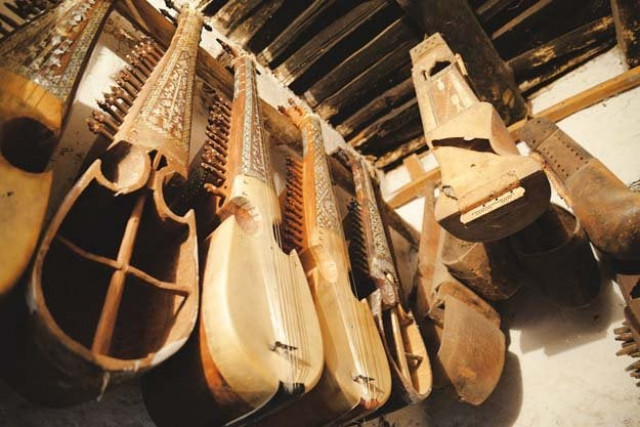Swat musicians find life out of tune
Meagre incomes and disinterested audiences push marginalised musicians into a corner

Rabab. PHOTO: EXPRESS
As visitors enjoy their meal, few pay attention to the musicians performing live. Some though, occasionally, request some songs.
While peace has returned to the valley, and with it its musician community, normalcy is still some way off as they pick up the pieces after years of militancy.
Swat was once famous for Pashto musicians, arts and singers and it created famous and well-known singers of the time like slain Ghazala Javeed, Kiran Khan, Nazia Iqbal, Shabana, Nelo Khan and others.
As the Taliban took hold in the valley around a decade ago, musicians were among their first target. Many were forced from the valley, others had to conform to the Taliban’s stringent interpretation of religion and abandon music.
Fawad Khan to return to music with mega Pepsi project
At the hotel, 40-year-old Rabab player Fazal Raheem and 50-year-old tabla maestro Bakht-e-Shadan, decked out in traditional shalwar kameez and a waistcoat, continue to play out tunes of popular Pashto songs to an often disinterested audience. Beyond sharing a stage, the two musicians share the dread of the militancy.
“We have seen the hard times under the Taliban very closely, when there was a complete ban on listening to music and most of the musicians, artists and singers had fled the area” Raheem shared.
“On the one hand the Taliban had banned all sorts of musical activities, on the other, they directed artists to vacate the valley,” he said.
Both Raheem and Shadan were also forced to flee from the valley, shifting to Mardan along with their families to ride out the terror wave with their relatives.
“I hail from a family of butchers and no one in my family is associated with music. But I was fond of playing the rabab from a very young age,” Raheem said, adding that he had been playing the string instrument for the past 20 years.
Asked what convinced him to leave, Raheem said that he was playing the rabab in his store when some armed men, ostensibly aligned with the Taliban, barged in. They assaulted him and warned him against playing music.
To make sure that he did not repeat the “offence”, the armed men, Raheem said, broke his precious rabab.
“For a long time I was away from the rabab,” the musician cried.
“Believe me, it was the hardest time of my life and due to the terror of those armed men, I could not even pick up the instrument. But when the situation normalised, I couldn’t wait to play it again,” he shared.
Shadan, who said that his father had taught him how to play the tabla, echoed Raheem’s experience, noting that the years of Taliban rule were definitively the worst.
While they may have returned to the valley and their instruments are no longer under the cloud of militancy, their music – thus their life – is not completely free of militancy’s burden. Once a thriving profession, musicians in post-militancy-Swat are finding that making a living is increasing tough.
“We each earn Rs11,000 per month, which is insufficient to support an 11 member family,” Raheem said while talking to The Express Tribune, adding that they play for three hours at the hotel.
The rabab player has nine mouths to take care of at home, while his musical partner Shadan has eight children to take care of.
Karachi Music Festival ends today
Lamenting their meagre incomes, the two men said that they are compelled to play these instruments, for if nothing, they are as important as family too Shadan complained that musicians or artists were no longer valued in the valley anymore. While people listen to their music, they are not keen on taking care of the musicians producing those melodious notes.
“We tried to contact the Radio Pakistan, Pakistan Television, Khyber-Pakhtunkhwa Cultural Department several times, but no one was even ready to listen to our grievances,” he cried.
Raheem and Shadan both urged the K-P cultural department and even the PTV to give them a chance to perform.
They also requested the K-P cultural department to help them since they had suffered from militancy like musicians from other parts of K-P who were then provided fixed monthly stipends from the provincial government.
Published in The Express Tribune, January 15th, 2018.













COMMENTS
Comments are moderated and generally will be posted if they are on-topic and not abusive.
For more information, please see our Comments FAQ